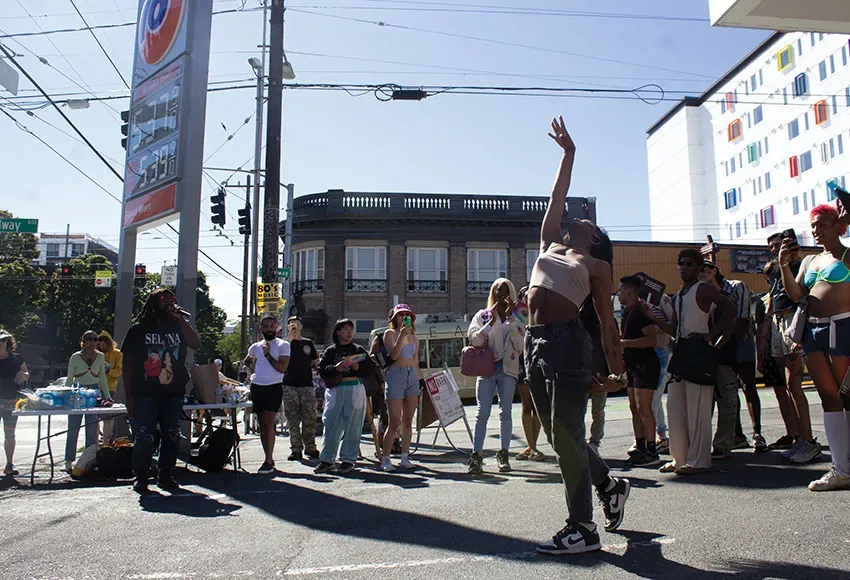On Friday, August 4, 2023, hundreds of protesters gathered at the 76 gas station on Broadway on Capitol Hill with flowers and signs to mourn the brutal murder of O'Shae Sibley, a Black Gay man stabbed to death at a gas station in New York City. Sibley was stabbed in the chest by an unidentified 17-year-old boy on the night of July 29. He was pronounced dead when he arrived at the hospital. He was only 28.
While the gathering may have seemed familiar to onlookers – members of marginalized communities mourning the loss of yet another Queer Black person – it was anything but.
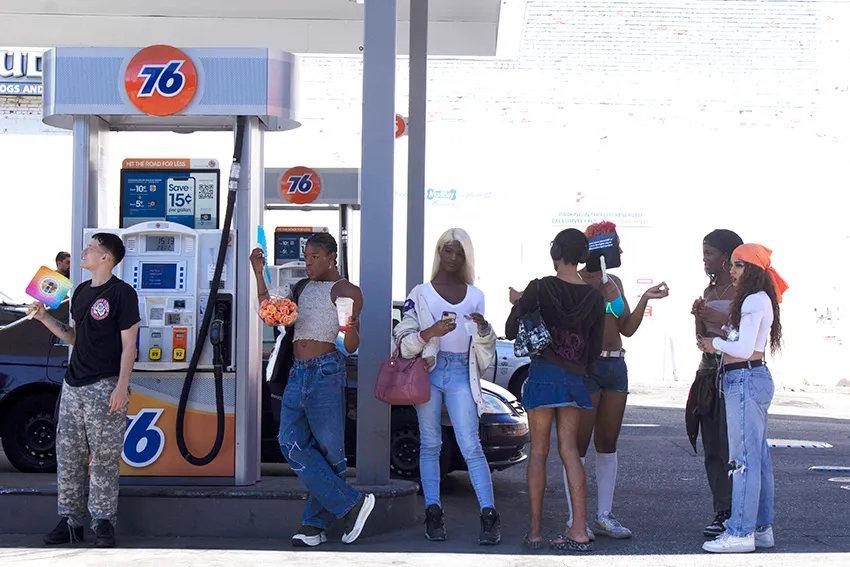
Protesting with bodies
"I was thinking about another Black life senselessly taken for no reason," event commentator Notorious T said into the microphone as the crowd formed a large circle beside the gas pumps. "They would want to be celebrated, so we're going to have a good time. DJ, pop the beat when you're ready."
Bass gave new life to the mourning crowd as Notorious T began to call out the names of members of Seattle's ballroom community to come forward and move their bodies to honor Sibley, who was a professional dancer. Their brilliance shone through every drop, twist, and leap.
While nobody at the protest knew Sibley personally, it still felt as though they'd lost a close friend or family member, because, in a way, they had. Sibley was a part of the ballroom community, a Black and Brown LGBTQ+ subculture that began to flourish toward the end of the 20th century.
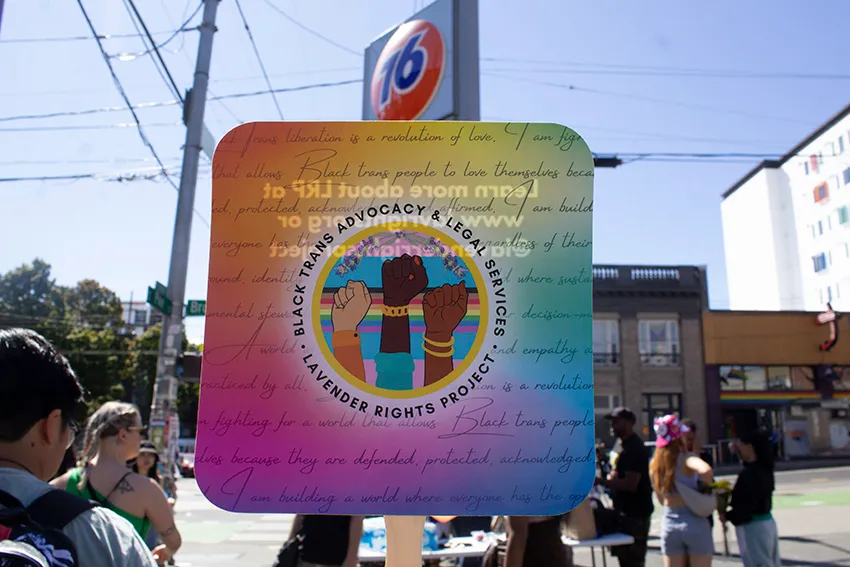
"[Ballroom] was a safe space created by Queer and Trans Black and Brown people," event organizer Julian Everett said. "[Ballroom is] a safe space of inclusivity, because we didn't feel included within the general public of LGBTQ+ people. We needed to have a space of our own, and also for us to be celebrated and affirmed of our talents and visibility, and our lived experiences. We haven't necessarily had those spaces given to us, and we had spaces taken away from us. We had to create them on our own."
Ballroom is more than just a space for people to dance – it's a place where found families are established, a haven for Black and Brown LGBTQ+ people often excluded from white, cis-normative spaces. The environment has shaped modern drag culture, and its influence has extended even beyond Queer and Trans people. Ballroom is known for high-energy music, elaborate costumes, and voguing – which Sibley was doing when his attackers took notice.
"I want you to understand how impactful this was – we didn't just lose anybody, we lost a member of the ballroom community," Everett said to the crowd before the music began.
"O'Shae was with his friends, like we are in this very parking lot, just chilling, not doing anything harmful. Some people had other plans and an agenda. O'Shae decided to go ahead and try to handle it as best as possible, in a nonviolent way. They decided to get violent, and unfortunately, he was stabbed and died. That's the reality that could happen to any of us in this parking lot right now, because we are all a part of ballroom – even if we are not a part of houses. Even if we simply just admire ballroom, we are still at risk."
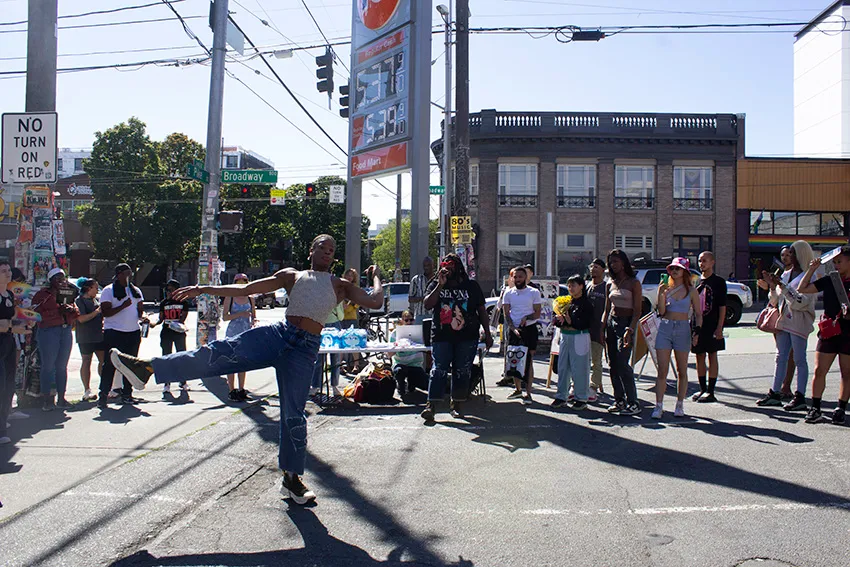
"Voguing is not a crime"
Everett concluded his speech by thanking the members of Seattle's ballroom community for coming out and showing their camaraderie with Sibley. He also acknowledged that the violent murder of BIPOC and especially Queer and Trans BIPOC people is far too common.
"We're going to allow our creativity, our capability to use our bodies as a sense of protest so that people know you can't get rid of us, you can't stop us, you can't stop ballroom," Everett said. "Ballroom is not a crime, voguing is not a crime. At the end of the day, like it or love it, we're going to keep it moving."
For over an hour, participants shook, shimmied, and strutted through a supportive circle. After each person who participated ended their set, Notorious T encouraged others to give them a round of applause.
Acts of bravery
The protest was joyous and sorrowful, beautiful and tragic, and above all, an act of sheer bravery.
Hundreds of people, particularly young ones, showed up to do something they love, something they now knew (if they didn't before) could get them killed. Despite what happened to Sibley, the dancers at the protest showed no fear.
"I'm here to vogue out for O'Shae Sibley," said Aaliyah Williams, a young woman who showed up with flowers and later showed off her amazing skills.
"We are happy in our Black Trans Queer bodies," Williams' friend, Hippolyta Toussaint, added.
"We are here today in the name of O'Shae," said Zakai Davis-Rodriguez. "He was a Black Queer man who was stabbed at the gas station for simply just expressing the way he identifies through dance. It's too common: people getting attacked for who they're born to be. We're here today to express ourselves through our dance. We're here to come together as a community and show we're stronger as a community. You can take one of us away, but more will come back."
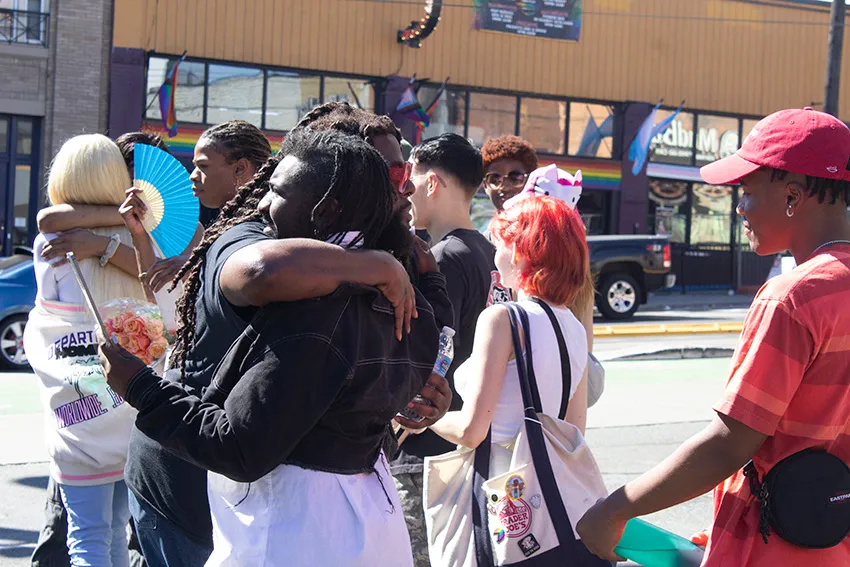
The country mourns for Sibley
Seattle wasn't the only city to hold a dance-out for Sibley. Throughout the country, the ballroom community came together to honor his memory. Even Beyoncé wrote an online statement about him.
In Brooklyn, where he lived, dancers marched through the street from an LGBTQ+ center to Pier 46, a favored spot for ballroom houses. There they set up candles in the shape of his name, laid flowers on the ground, and splattered fake blood.
"As a member of the ballroom community, I don't feel that I would be doing my part by simply remaining quiet, remaining silent," Everett said as he reflected on why he decided to organize an event in Seattle for a man murdered thousands of miles away.
"This will not stop ballroom from existing," he continued. "We all deserve inclusivity, and we all deserve space. [We want] to simply bring awareness that hate crimes are still occurring and are higher amongst Black and Brown Queer folks and Trans folks in the United States. So we continue to push for solidarity."
Everett believes the best way to honor Sibley's life is by supporting the community he loved. In Seattle, that can mean giving to nonprofit organizations like the Lavender Rights Project and Project Kiki. The event's organizers also stressed the importance of showing loved ones that they matter.
"This is how we save lives: we show up, and we love on each other, every moment that we get, because we don't know what we'll get, what will happen tomorrow," another speaker, Aariyah, said.
Anyone interested in donating or volunteering with the Lavender Rights Project can visit https://www.lavenderrightsproject.org


